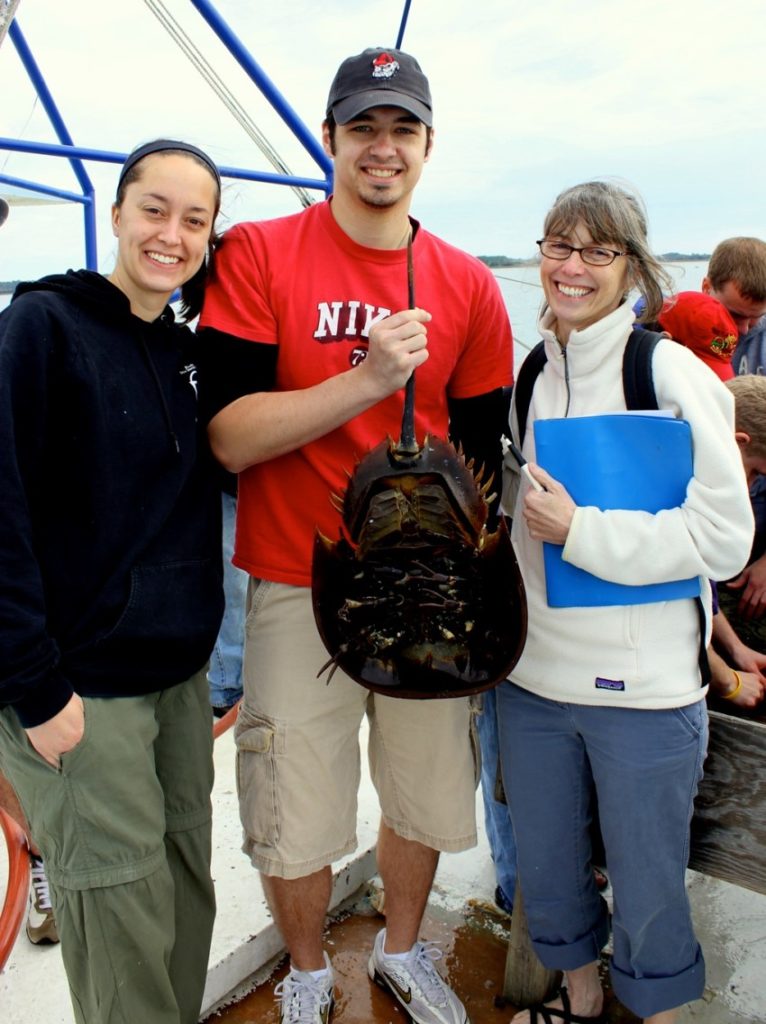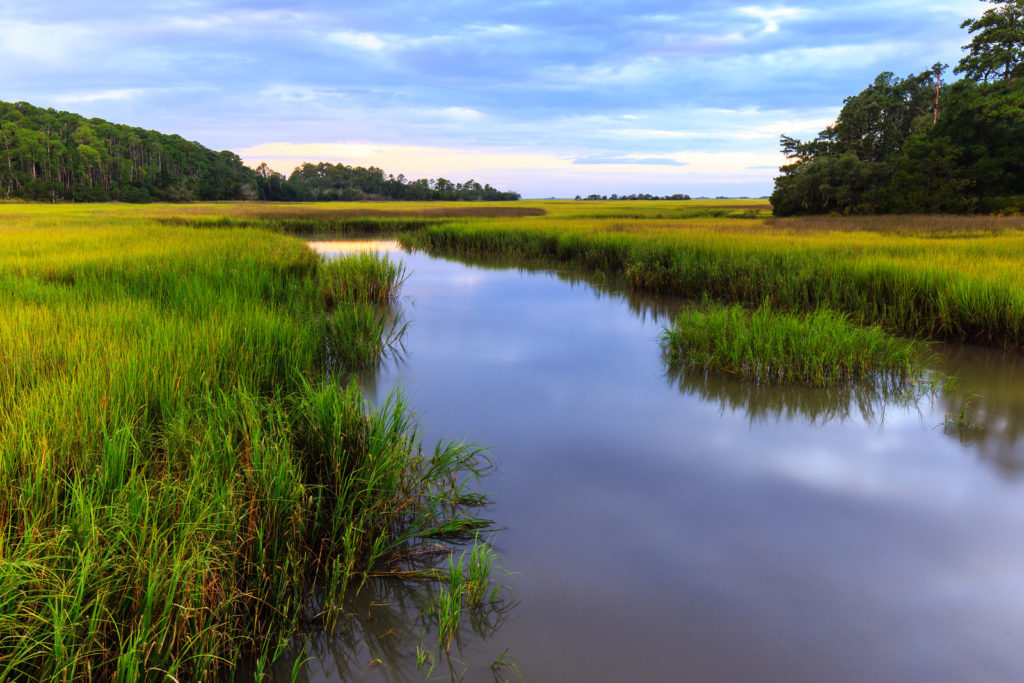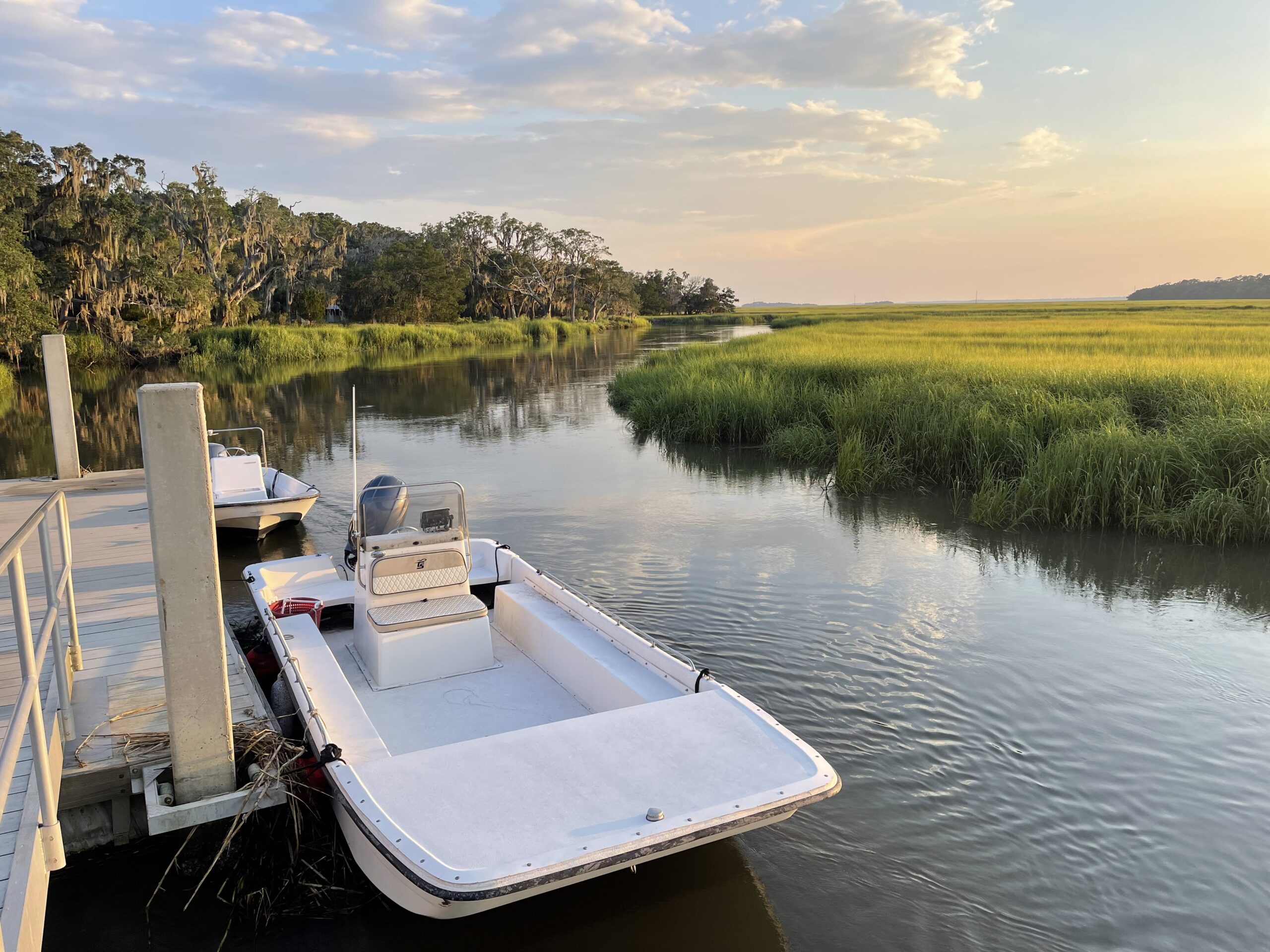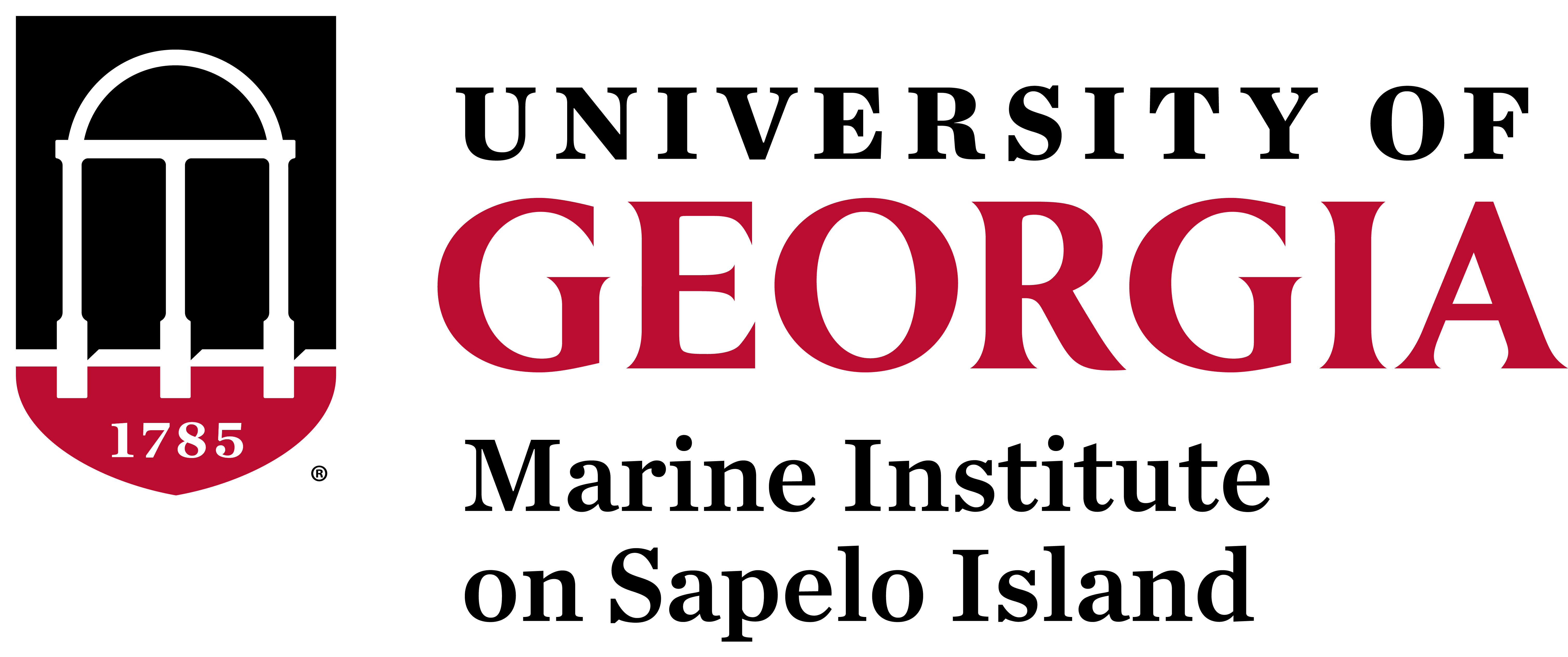Undergraduate Programs

Every year, 600-700 university students participate in academic programs at UGAMI. These students come from colleges and universities all over the U.S. and from many countries around the globe. It is hard to overstate the impact of a visit to UGAMI for students. Come see us if you get the chance!
“Having participated in prior directed research on campus, this experience was starkly different. I had a ton more freedom in developing a question and designing methodologies to test my ideas. This freedom facilitated a deeper understanding of the scientific process and in particular how it could be applied to my project. Independent research on Sapelo gave me a greater sense of pride and accountability because the work was almost totally my own. At the beginning of the course I was apprehensive about conducting my own project, but now as the course ends I realize that I have developed something I am proud of.” – Student in the 2023 Coastal Summer Semester program
Courses at UGAMI
More information on courses offered by or held at the University of Georgia Marine Institute (UGAMI) can be found by clicking the links below.

Marine Biology Spring Semester
Interested in spending a semester on a pristine Georgia barrier island that is known for its history, culture, and scientific discoveries? Join us at the University of Georgia Marine Institute on Sapelo Island for spring 2024. Students experience an immersive learning environment focused on the various components of barrier island and nearshore ecosystems, with courses in Ecology, Marine Biology, Invertebrate Biology, Marine Fisheries, and the Ecology of the Georgia coast. The program is open to both UGA and non-UGA students pursuing degrees in biology, ecology, ocean science, fisheries, wildlife biology, and environmental science. Students earn 17 credit hours. Financial assistance is available. For more information contact Dr. Thomas Hancock, Assistant Director for Academics, University of Georgia Marine Institute on Sapelo Island, thomas.hancock@uga.edu, 912-485-2221 ext. 2290.
Courses:
MARS 3450/L: Marine Biology w/ lab
ECOL 3500/L: Ecology w/ lab
BIOL 3720/L: Field Animal Behavior w/ lab
MARS/FISH 4380/L: Marine Fisheries Biology w/ lab
ECOL 3480: Coastal Ecosystems
ECOL/BIOL/MARS 4960R: Independent Research
MARS 4160: Life and Death in a Salt Marsh w/ lab
Courses:
ECOL 4225/L: Methods in Marine Ecology w/ lab
ECOL/BIOL/MARS 4960R: Independent Research
Geography of the Georgia Coast
Ecological Problem Solving Program
Interdisciplinary Field Program
Colonial and Native Worlds Field School


Student Research
Most of UGAMI’s residential academic programs give students an opportunity to conduct their own research project under the mentorship of a faculty member. Performing independent research allows students to put to use the knowledge they gained in their classes. For many students, this is their first chance to actually “do science” and it can be a life-changing experience. Research topics span a broad spectrum of topics in the fields of microbiology, biochemistry, organismal ecology, population biology, community ecology, ecosystem ecology, and oceanography. Projects can be observational or experimental. Nearly all have a field study component. Some include laboratory studies.
Undergraduate Independent Research Projects
2017
| Measuring Immune responses of white shrimp - Ali Minning, Summer 2017 |
| Body conditions of white shrimp exhibiting advanced black gill disease - Elizabeth Butler, Summer 2017 |
| Shell selection by hermit crabs, Uca pugnax - Mackenzie Hay, Summer 2017 |
| Spatial Patterns in distribution of Littoraria - Dillon Richter (Georgia Southern University), Summer 2017 |
| Food chain dynamics of mudflats - Katie Mailloux, Summer 2017 |
| Trophic ecology of southern stingrays - Abbey Pylant, Summer 2017 |
| Filter feeding by ribbed mussels - Jordan Honeycutt, Summer 2017 |
| Field measurements of filtration by oyster reefs - Kristen Mullis, Summer 2017 |
| Tidal and spatial patterns in phytoplankton concentration and community structure in the Duplin River - Hannah Moore, Summer 2017 |
2018
| Organic and Inorganic Sediment Deposition in Relation to Changing Sea Levels - Melody Modarressi, Summer 2018 |
| Ground Truthing Elevations of Habitats in a Lidar-Derived Digital Elevation Model of the Sapelo Island National Estuarine Research Reserve - Sadneya Ghag, Summer 2018 |
| Distribution of Spotted Sea Trout and Atlantic Croaker in the Duplin River - Bailey Reins, Summer 2018 |
| Seasonal and Diel Calling Patterns of Oyster Toadfish - Danielle Jenkins, Summer 2018 |
| The Effects of Parasitic Isopods on Three Species of Sciaenid Fishes - Håkon Jones, Summer 2018 |
| The Effect of Salinity on Filtration Rates of the Eastern Atlantic Oyster, Crassostrea virginica - Viviana García Roqueta, Summer 2018 |
| Response of Eastern Oysters to Short-Term Temperature Elevation - Britni Hendrickson, Summer 2018 |
| Behavioral Responses of Juvenile Permit (Trachinotus falcatus) to Low Concentrations of Dissolved Oxygen - Nicole de La Torre, Summer 2018 |
| Reactions of Marsh Periwinkle Snails to Predatory Signals - Dylan Samsel, Summer 2018 |
| Endogenous diurnal and tidal rhythms of melanophores in the fiddler crab, Uca pugnax - Jamie Rogers (Georgia Institute of Technology), Summer 2018 |
| Habitat Preference of the Fiddler Crab (Uca pugnax) - Kristen Wallace, Summer 2018 |
| Burrowing habits of the ghost crab, Ocypode quadrata, on Sapelo Island, Georgia - Lara Lindsay, Summer 2018 |
2019
| Structure of the Fish Community in the Duplin River - Alaina Davis, Summer 2019 |
| Distribution of Loggerhead Turtle Nests Along Nannygoat Beach in Relation to Elevation and Beach Slope - Abbey Vanderpoel, Summer 2019 |
| Filtration of Chlorophyll a by Crassostrea virginica, - Anya Jaye Lesser, Summer 2019 |
| Biomass Enhancement of Spartina alterniflora by Geukensia demissa Mounds - Ivy Francis, Summer 2019 |
| Soil Organic Matter and Heat Capacity in Airport Marsh, Sapeo Island - John Kolb, Summer 2019 |
| Effects of Flood Duration on the Relative Abundance of Benthic Diatoms in the Tidal Creek Banks - Lauren Faircloth, Summer 2019 |
| Effects of Nitrogen and Phosphorus Fertilizer on Benthic Microorganisms on a Salt Marsh Creek Bank - Bradley Macket, Summer 2019 |
| Does the Amount of Algae Coating the Shells of Salt Marsh Periwinkles (Littoraria irroratta) Affect their Risk of Predation by Blue Crabs (Callinectes sapidus)? - Britney Pepper, Summer 2019 |
| Bioaccumulation of Nanoplastic Particles in Ribbed Mussels (Geukensia demissa) in a Georgia Marsh - Brady Griggs, Summer 2019 |
| Distribution of Ghost Crab (Ocypode quadrata) Burrows with Respect to Loggerhead Sea Turtle (Caretta caretta) Nests - Rachel Krunkosky, Summer 2019 |
| Acoustic Response of Spotted Seatrout, Cynoscion nebulosus, to Sounds Associated with Predation - Kyle Craig, Summer 2019 |
2020
| The Effect of Tidal Phase on Variability of Trawl Catches in the Duplin River - Braden Biddy (University of North Georgia), Spring 2020 |
| Impacts of Seismic Airgun Blasting on Marine Organisms off the Georgia Coast - Hannah Mone, Spring 2020 |
| Fish Communities of the Duplin River, Sapelo Island, GA - McKenna Johnson (University of North Georgia), Spring 2020 |
2021
| Evaluation of Catch Efficiencies Between Two Different Warps for a Small Otter Trawl Near Sapelo Island, Georgia - Jonah Rigdon (College of Coastal Georgia), Spring 2021 |
| Distribution of organic soil organic matter relative to the presence of Geukensia demissa mounds – Nellie Little (College of Coastal Georgia), Spring 2021 |
| Assessing the ability of Foram-AMBI to quantify the ecological health of salt marsh ecoystems – Reese Lofgren, Spring 2021 |
| Antibacterial Properties of the Slime Coat of Estuarine Fish Near Sapelo Island, GA - Veida Stringfield, Summer 2021 |
| The Effects of Salinity on the Activity and Behavior of the Long-Clawed Hermit Crab, Pagurus Longicarpus - Courtney Bass (University of Tennessee), Summer 2021 |
| Background Color Preference of Lolliguncula brevis Under Various Behavioral Contexts - Aishah Burke, Summer 2021 |
| Understanding the Spatial Awareness and Dispersion of Keyhole Urchins Mellita quinquiesperforata Through Their Movement Patterns - Maggie Huff, Summer 2021 |
| Burrow Habitat Selection of Gopher Tortoises (Gopherus Polyphemus) on Sapelo Island, GA - Amelia Floryance (Georgia State University), Summer 2021 |
| Investigating Habitat Overlap of Spotted Sea Trout and Atlantic Croaker in the Duplin River Using Passive Acoustic Methods - Maxine Heffron, Summer 2021 |
| Spatial Distribution and Abundance of Microplastics in the Altamaha River Delta - Daniela Llarena, Summer 2021 |
| Variations in Abundance and Species Diversity of Gelatinous Zooplankton in Relation to Tidal Phase in Dean Creek and the Duplin River, Sapelo Island, GA. -Jenna Brown, Summer 2021 |
| Bird Abundance and Diversity in the Beach Habitat on Sapelo Island, Georgia - Katie Galbreath, Summer 2021 |
| Diel Patterns in Abundance and Diversity of Bird Species in the Salt Marshes of Sapelo Island, GA - Marisa Vilardi, Summer 2021 |
| Comparisons of Macrofauna in Two Freshwater Ponds on Sapelo Island, GA - Avery Kelly, Summer 2021 |
| Relative Abundance, Species Diversity and Length-Frequency Distributions of Fishes in the Runnels and Surf Zone on Sapelo Island, GA - Taylor Mizelle, Summer 2021 |
| Applying the Marsh Equilibrium Model to Spartina alterniflora on Sapelo Island, GA - Carolina Melendez Declet, Summer 2021 |
2022
| Impact of Tide on Fish Species Diversity in the Duplin River and its Tributaries - Luke Brown, Summer 2022 |
| Bacterial Respiration Along the Duplin River - Mason Watkins, Summer 2022 |
| Microplastic concentrations and distribution along the Duplin river - Junato Qui, Summer 2022 |
| Bacterial Production In Coastal Estuary Systems - Andrew Meinster, Summer 2022 |
| Atlantic Marsh Fiddler Crab, Minuca Pugnax, Movement Based on Elevation in Sapelo Island, GA Salt Marsh - Emilie Dudgeon, Summer 2022 |
| The Effects of Soil Depth and Distance along the Duplin River on Microplastics in Marsh Sediment at Sapelo Island, GA - Kelly Nguyen, Summer 2022 |
| Eastern Oyster (Crassostrea virginica) Clearance Rates in Relation to Water Temperature Changes - Martha Wilbur, Summer 2022 |
| Environmental Impacts on Nesting and False Crawl Behavior of Loggerhead Sea Turtles (Caretta caretta) - Caitlin Lyons, Summer 2022 |
| Clumping Behavior of the Eastern Mudsnail (Ilyanassa obsoleta) Under Lab Conditions - Huck Bagby, Summer 2022 |
| Effects of Local Slope and Vegetation Distribution on Loggerhead Sea Turtle (Caretta caretta) Nesting Activity - Joy Chapman, Summer 2022 |
| Effects of Fish Abundance and Diversity on the Prevalence of Trematode Parasites in the Eastern Mudsnail (Ilyanassa obsoleta) - Jim Secor, Summer 2022 |
| Effects of Temperature on the Respiration of Fundulus heteroclitus - Deneka Christian, Summer 2022 |
2023
| The factors affecting canopy temperature of marsh grasses, Spartina alterniflora and Juncus roemerianus - Lily Shorrock, Summer 2023 |
| Defining parameters that influence Iva frutescens in the high marsh and upland-marsh transition zone - Alexis Davis, Summer 2023 |
| The effect of temperature on the relationship between microzooplankton grazing rates and apparent phytoplankton growth - Nina Caprice, Summer 2023 |
| Interaction of tidal elevation and predators on filtration rates of the eastern oyster, Crassostrea virginica - Ella Bourbonnais, Summer 2023 |
| Abundance and species richness of small nekton along Oakdale creek - Cullen LeJeune, Summer 2023 |
| Variation in fish abundance and biomass across sandy beach habitats across Sapelo Island, Georgia - Reagan Greene, Summer 2023 |
| Abundance and diversity of parasitic isopods in the Cymothoidae family on Sapelo Island - Stephanie Jones, Summer 2023 |
| The effects of surface temperature and substrate type on the burrowing habits of Minuca pugnax - Shion Zaman, Summer 2023 |
| Examining the distribution patterns of Littoraria irrorata on Spartina alterniflora stems - Clara Mitchell, Summer 2023 |
| Effects of Boring sponge (Cliona celata) infection in Eastern oysters (Crassostrea virginica) on crab prey selection - Ryan Testino, Summer 2023 |
| The interaction of boring sponge (Cliona celata) and pea crabs (Zaops ostreum) on oyster (Crassostrea virginica) condition - Ashley Little, Summer 2023 |
| Variation in marsh periwinkles (Littoraria irrorata) density, size and infection prevalence across the marsh platform - Saumya Gade, Summer 2023 |
| Investigating the susceptibility of polychaetes to cercarial trematode infection - Sarah Dean, Summer 2023 |
| Prevalence of the castrating barnacle, Loxothylacus panopaei, in the flatback mud crab Eurypanopeus depressus and its effects on host consumption - Bella Burhanna, Summer 2023 |
Field Trips
UGAMI is a destination for University of Georgia courses, as well as other University System of Georgia institutions, and beyond. Field trips are generally arranged over a weekend, although some classes visit for longer periods of time.
College or university-level instructors who are interested in arranging a class field trip to UGAMI should fill out a UGAMI education request form (please download, complete and save the form, then email it to graciet@uga.edu) or contact the Program Coordinator, Gracie Townsend.
Classes that have visited UGAMI:
Classes that have Visited UGAMI
University of Georgia
| Course ID | Course Name |
|---|---|
| ANTH 2120H | Introduction to Anthropology |
| ECOL 3300 | Field course in Ecological Problem Solving |
| FISH 4650 | Georgia Fishes Field Class |
| GEOL 2010 | Life, Ecology and Environments of the Past |
| IFP | Honors Interdisciplinary Field Program includes a visit to UGAMI |
| MARS 1010L | Introduction to the Marine Environment |
| MARS 3450 | Marine Biology |
| WILD 3580 | Vertebrate Natural History |
Other Universities
| Name | Course ID | Course Name |
|---|---|---|
| Armstrong State University (GA) | BIOL 4970 | Barrier Island Ecology |
| Ball State University (IN) | BIOL 420/520 | Coastal Ecology |
| Brown University (RI) | BIO 144 | Marine Ecology |
| GA College & State University (GA) | GEOL 4951 | Hydrogeology |
| Georgia Gwinnett College (GA) | BIOL 3150 | Temperate Biology |
| Georgia Perimeter College (GA) | BIOL 2108 | Principles of Biology II |
| Middle Georgia State College (GA) | BIOL 3360 | Plant Biology |
| Middle Georgia State College (GA) | BIOL 3450 | General Microbiology |
| Middle Georgia State College (GA) | BIOL 3666 | Entomology |
| Middle Georgia State College (GA) | BIOL 4323 | Marine Biology |
| Oglethorpe University (GA) | BIO 380 | Conservation Biology |
| University of North Georgia (GA) | BIOL 4461 | Marine Field Study |
| South Georgia State College (GA) | BIOL 2107 | Principles of Biology I |
| South Georgia State College (GA) | BIOL 3545 | Vertebrate Zoology |
| South Georgia State College (GA) | SCIE 1111 | Environmental Science |
| Valdosta State University (GA) | BIOL 3250 | Ecology and Evolution |
| Valdosta State University (GA) | BIOL 3650 | Plant Systematics |
| Valdosta State University (GA) | BIOL 4020 | Coastal Biodiversity |
| Valdosta State University (GA) | ISCI 3103 | Natural History of Georgia |
Academic Programs
UGAMI does not grant degrees. However, several academic programs at University of Georgia partner with UGAMI for part of their programming.
- Ocean Science Major
- Biology Major, Marine Sciences concentration
- Interdisciplinary Studies in Marine Sciences
- Ecology Major
Internships
The Georgia Coastal Ecosystems LTER project runs a summer internship program, with opportunities at UGAMI.
